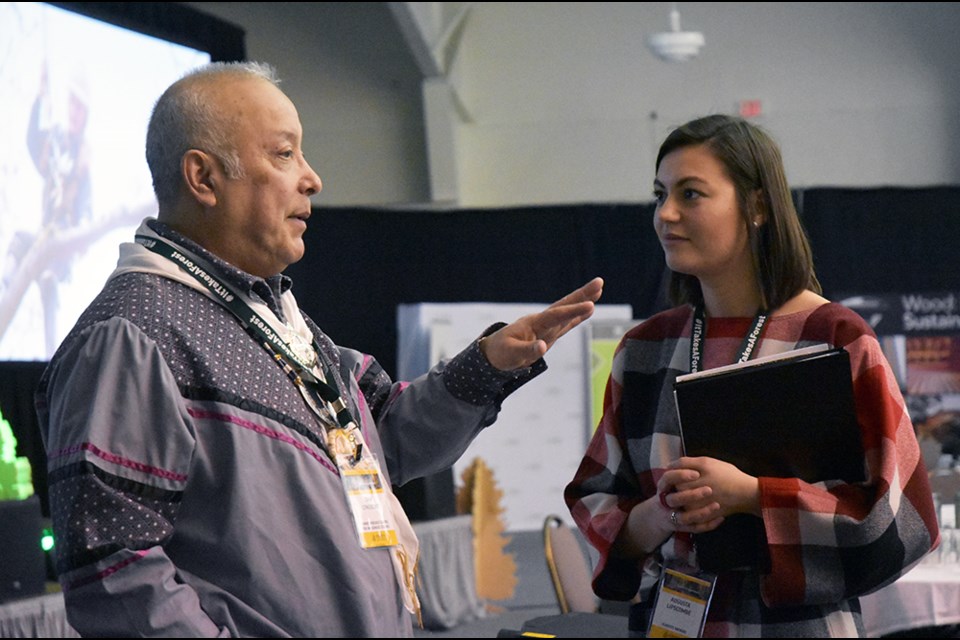The “largest forestry conference in the province” took place at the Nottawasaga Inn Resort near Alliston recently, drawing more than 430 attendees, from forestry experts and environmentalists, to municipal officials and nearly 100 university students.
“This is a new record for us,” said Rob Keen, CEO of Forests Ontario, which hosts the annual conference. “So many students coming here – a younger generation. These are our future stewards.”
They were gathered to talk about the importance of Ontario’s forests in a changing world, on the theme "Natural Connections" - focusing on connections within the natural world, and human connections.
“It is our environment that sustains us,” said Keen. “That a healthy environment sustains healthy communities is often lost on people who set our priorities.”
He called for more understanding, greater dialogue, “a willingness to step out of our allegiances and… respectful collaboration across multiple cultures.”
The call for “connections” and collaboration was echoed by speakers that included Dr. Dan Longboat, who delivered the keynote address at the Feb. 8 event.
Longboat, a member of the Turtle Clan of the Mohawk Nation and associate professor at the Chanie Wenjack School for Indigenous Studies, told the conference “we have to recognize we’re in a state of flux now,” driven on the one hand by population growth and technology, and on the other by environment concerns.
“We have to struggle to achieve a balance,” said Longboat, urging leaders and educators to also access indigenous knowledge systems, developed over millennia, that demonstrate how to live in the natural world.
He noted: “Western science, western technology, western forms of education have provided a unique way of seeing the world… One of the things that seems to be missing is the opportunity to engage in cross-cultural dialogue.”
Accessing indigenous knowledge and worldviews can provide “an entirely different set of tools in our tool belt… to handle the complexity of issues we are facing right now,” he said.
Longboat urged those involved in the forestry sector to take a new approach.
“Anyone who benefits from the natural environment has the responsibility to care for that natural environment,” he said, adding trees are more than a physical presence. “They are a living entity. We see the power and majesty of that entity… They are alive, they have spirit, they have power. When we see that, we have respect and appreciation for that.”
Trees produce oxygen, trap carbon dioxide, add nutrients to the soil, prevent erosion, support biodiversity, and provide humankind with shelter, fire and medicines, he said.
“At the same time (they) are under threat,” Longboat said. “We need to recognize and strengthen and bolster them,” accepting a responsibility to sustain and respect the natural world.
“This reciprocal relationship… has sustained life through the millennia.”
He added, “We live in the most complex and complicated time in human history,” faced with an onslaught of issues, from population growth, to desertification, to loss of biodiversity. “If we’re going to resolve and mitigate the impact it’s going to demand we work together. For us, it means all hands on deck.”
The connections between a healthy environment and good health, between forests and biodiversity, forests and culture, and forests and the economy were explored by other speakers, in morning and afternoon sessions.
Despite challenges to the industry, forestry supports approximately 180,000 jobs across Ontario, according to Forests Ontario, and the Forest Products Association of Canada has identified that the sector generates $80 billion per year, nationally.
The message was that, as global markets change and management practices adapt to climate change, the industry is increasing aware of the importance of innovation, sustainability and inclusion.
“Relationships and representation are two fundamental things, as we talk about forestry in Ontario,” said Dean Assinewe, industry advisor for FPInnovations, a not-for-profit research company specializing in innovative scientific solutions for the forest sector. “Forest management has been in play and mandated for the past 30 years,” but has tended to exclude “the grassroots people” including First Nations from decisionmaking.
He urged the industry to reach out, take a holistic approach, and engage indigenous peoples and youth.
“I believe we’re on the right track,” Assinewe said. “We’re moving into the future. We need jobs, we need that connection with the world.”
There were opportunities to network and create connections at the conference. Delegates were encouraged to share their views with each other, especially with the students attending the sessions.
“Make some new connections, who may not know about the importance of forests or the value of forests,” urged Scott Jackson, Forests Ontario’s director of indigenous and stakeholder relations.


